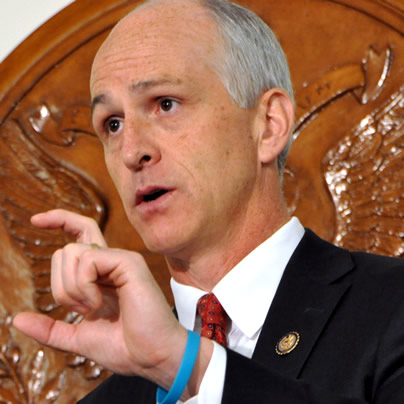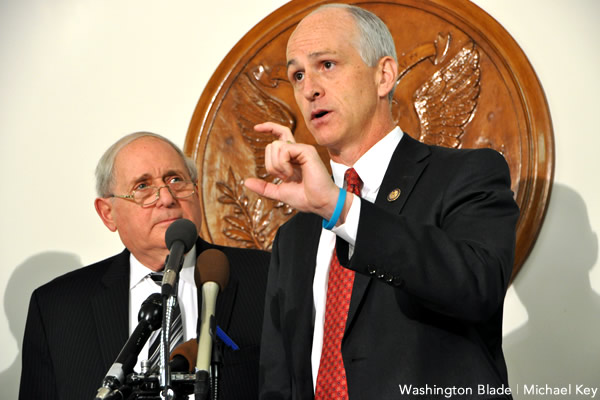National
Defense budget bill includes ‘conscience’ provision
Rep. Smith says language watered-down to have no substantive impact

The final version of major Pentagon budget legislation includes watered-down “conscience” language similar to the anti-gay provision found in the House version of the bill, according to a top House Democrat on defense issues.
Rep. Adam Smith (D-Wash.), ranking Democrat on the House Armed Services Committee, affirmed during a Capitol Hill news conference Tuesday language along the lines of Section 536 of the House bill made its way into the conference report for the fiscal year 2013 defense authorization bill, although the scope of the language is more limited.
Other language found under Section 537 of the House bill prohibiting same-sex marriages from taking place on military bases, Smith said, was removed from the final version of the bill. Smith made the remarks in response to a question from the Washington Blade.
“We struck the second provision,” Smith said. “There is modified conscience clause language still in the bill … Basically, you can believe what you believe and not be punished for it, but if your actions based on those beliefs are counter to the Uniform Code of Military Justice or counter to what’s necessary, that can be held against you. But you can’t be punished solely for your beliefs. We modified that first language, struck the second language.”
Asked whether the language applies to only chaplains or all service members, Smith replied, “Anybody.”
Following Smith’s remarks, Sen. John McCain (R-Ariz.), top Republican on the Senate Armed Services Committee, added, “Of course as chaplains are concerned, they have the tenets of their faith.” Senate Armed Services Committee Carl Levin (D-Mich.) then added, “It is conduct which we’re going after on the part of the chaplains, not beliefs.”
Asked afterward by the Blade whether there was significant discussion during the conference committee about the conscience language, Smith voiced his personal opposition to the language.
“Just to be honest, I don’t support the conscience language that’s in the bill,” Smith said. “Now they stripped it down, they made it to the extent that it’s pretty neutral. It basically says you cannot be punished solely for your beliefs, OK? It’s language that I don’t think belongs in the bill.”
Smith added that it will have no substantive impact on service members and he’ll support the defense authorization bill as a whole.
“I think that’s current law,” Smith said. “You can’t punish someone based solely on their beliefs. It has to be actions. That’s current law. I didn’t think that this language needed to be in it. If you ask me, what the one thing I would take out of this bill, if I could, that would be the one thing I would take out of this bill. Now, it’s significantly neutered, if you will, to the point where I don’t think it’s going to be a problem, and I’m going to support the bill, but that is a provision that I did not support.”
A summary of the defense authorization bill published by House Democrats after the news conference is in line with Smith’s description of the language. Under the heading, “Other Personnel Matters,” a bullet point states the bill “[r]equires the Armed Forces to accommodate the beliefs of a service member and chaplain reflecting the service member’s or chaplain’s conscience, moral principles or religious beliefs, and in so far as practicable, would prohibit use of such beliefs as the basis for any adverse personnel action, discrimination, or denial of promotion, schooling, training or assignment. The protection does not protect the speech or conduct of an individual, and preserves the authority to take disciplinary or administrative actions that threaten good order and discipline.”
The actual language of the defense authorization bill isn’t yet publicly available. Spokespersons for the House and Senate Armed Services Committees didn’t immediately respond to a request to provide the language. Floor votes on the conference report are expected to take place later this week.
Last week, the Washington Blade reported that some House Republicans in the conference committee were actively pushing for the conscience provisions as part of the final version of the defense spending measure. In the House bill, that language was inserted in the bill during committee markup by outgoing Rep. Todd Akin (R-Mo.), who later became notorious as a U.S. Senate candidate for suggesting that a woman can resist becoming pregnant after a “legitimate rape.”
That provision was understood to mean service members could actively harass their colleagues based on their perceived or actual sexual orientation without fear of reprisal. Additionally, it was understood to mean that chaplains would have free rein to discriminate against service members on any basis — including religion, gender, sexual orientation, race or any other characteristic — simply by saying serving them is contrary to their beliefs.
The White House said in May the Obama administration “strongly objects” to the conscience provision in the House version of the defense authorization bill along with a provision prohibiting same-sex couples from marrying on military bases as part of its Statement of Administration Policy. Still, the statement doesn’t go as far as issuing a veto threat if the final version of the bill includes these provisions. A White House spokesperson didn’t respond immediately on short notice to a request for comment.
U.S. Supreme Court
Supreme Court to consider bans on trans athletes in school sports
27 states have passed laws limiting participation in athletics programs

The U.S. Supreme Court on Thursday agreed to hear two cases involving transgender youth challenging bans prohibiting them from participating in school sports.
In Little v. Hecox, plaintiffs represented by the ACLU, Legal Voice, and the law firm Cooley are challenging Idaho’s 2020 ban, which requires sex testing to adjudicate questions of an athlete’s eligibility.
The 9th U.S. Circuit Court of Appeals described the process in a 2023 decision halting the policy’s enforcement pending an outcome in the litigation. The “sex dispute verification process, whereby any individual can ‘dispute’ the sex of any female student athlete in the state of Idaho,” the court wrote, would “require her to undergo intrusive medical procedures to verify her sex, including gynecological exams.”
In West Virginia v. B.P.J., Lambda Legal, the ACLU, the ACLU of West Virginia, and Cooley are representing a trans middle school student challenging the Mountain State’s 2021 ban on trans athletes.
The plaintiff was participating in cross country when the law was passed, taking puberty blockers that would have significantly reduced the chances that she could have a physiological advantage over cisgender peers.
“Like any other educational program, school athletic programs should be accessible for everyone regardless of their sex or transgender status,” said Joshua Block, senior counsel for the ACLU’s LGBTQ and HIV Project. “Trans kids play sports for the same reasons their peers do — to learn perseverance, dedication, teamwork, and to simply have fun with their friends,” Block said.
He added, “Categorically excluding kids from school sports just because they are transgender will only make our schools less safe and more hurtful places for all youth. We believe the lower courts were right to block these discriminatory laws, and we will continue to defend the freedom of all kids to play.”
“Our client just wants to play sports with her friends and peers,” said Lambda Legal Senior Counsel Tara Borelli. “Everyone understands the value of participating in team athletics, for fitness, leadership, socialization, and myriad other benefits.”
Borelli continued, “The U.S. Court of Appeals for the Fourth Circuit last April issued a thoughtful and thorough ruling allowing B.P.J. to continue participating in track events. That well-reasoned decision should stand the test of time, and we stand ready to defend it.”
Shortly after taking control of both legislative chambers, Republican members of Congress tried — unsuccessfully — to pass a national ban like those now enforced in 27 states since 2020.
Federal Government
UPenn erases Lia Thomas’s records as part of settlement with White House
University agreed to ban trans women from women’s sports teams

In a settlement with the Trump-Vance administration announced on Tuesday, the University of Pennsylvania will ban transgender athletes from competing and erase swimming records set by transgender former student Lia Thomas.
The U.S. Department of Education’s Office for Civil Rights found the university in violation of Title IX, the federal rights law barring sex based discrimination in educational institutions, by “permitting males to compete in women’s intercollegiate athletics and to occupy women-only intimate facilities.”
The statement issued by University of Pennsylvania President J. Larry Jameson highlighted how the law’s interpretation was changed substantially under President Donald Trump’s second term.
“The Department of Education OCR investigated the participation of one transgender athlete on the women’s swimming team three years ago, during the 2021-2022 swim season,” he wrote. “At that time, Penn was in compliance with NCAA eligibility rules and Title IX as then interpreted.”
Jameson continued, “Penn has always followed — and continues to follow — Title IX and the applicable policy of the NCAA regarding transgender athletes. NCAA eligibility rules changed in February 2025 with Executive Orders 14168 and 14201 and Penn will continue to adhere to these new rules.”
Writing that “we acknowledge that some student-athletes were disadvantaged by these rules” in place while Thomas was allowed to compete, the university president added, “We recognize this and will apologize to those who experienced a competitive disadvantage or experienced anxiety because of the policies in effect at the time.”
“Today’s resolution agreement with UPenn is yet another example of the Trump effect in action,” Education Secretary Linda McMahon said in a statement. “Thanks to the leadership of President Trump, UPenn has agreed both to apologize for its past Title IX violations and to ensure that women’s sports are protected at the university for future generations of female athletes.”
Under former President Joe Biden, the department’s Office of Civil Rights sought to protect against anti-LGBTQ discrimination in education, bringing investigations and enforcement actions in cases where school officials might, for example, require trans students to use restrooms and facilities consistent with their birth sex or fail to respond to peer harassment over their gender identity.
Much of the legal reasoning behind the Biden-Harris administration’s positions extended from the 2020 U.S. Supreme Court case Bostock v. Clayton County, which found that sex-based discrimination includes that which is based on sexual orientation or gender identity under Title VII rules covering employment practices.
The Trump-Vance administration last week put the state of California on notice that its trans athlete policies were, or once were, in violation of Title IX, which comes amid the ongoing battle with Maine over the same issue.
New York
Two teens shot steps from Stonewall Inn after NYC Pride parade
One of the victims remains in critical condition

On Sunday night, following the annual NYC Pride March, two girls were shot in Sheridan Square, feet away from the historic Stonewall Inn.
According to an NYPD report, the two girls, aged 16 and 17, were shot around 10:15 p.m. as Pride festivities began to wind down. The 16-year-old was struck in the head and, according to police sources, is said to be in critical condition, while the 17-year-old was said to be in stable condition.
The Washington Blade confirmed with the NYPD the details from the police reports and learned no arrests had been made as of noon Monday.
The shooting took place in the Greenwich Village neighborhood of Manhattan, mere feet away from the most famous gay bar in the city — if not the world — the Stonewall Inn. Earlier that day, hundreds of thousands of people marched down Christopher Street to celebrate 55 years of LGBTQ people standing up for their rights.
In June 1969, after police raided the Stonewall Inn, members of the LGBTQ community pushed back, sparking what became known as the Stonewall riots. Over the course of two days, LGBTQ New Yorkers protested the discriminatory policing of queer spaces across the city and mobilized to speak out — and throw bottles if need be — at officers attempting to suppress their existence.
The following year, LGBTQ people returned to the Stonewall Inn and marched through the same streets where queer New Yorkers had been arrested, marking the first “Gay Pride March” in history and declaring that LGBTQ people were not going anywhere.
New York State Assemblywoman Deborah Glick, whose district includes Greenwich Village, took to social media to comment on the shooting.
“After decades of peaceful Pride celebrations — this year gun fire and two people shot near the Stonewall Inn is a reminder that gun violence is everywhere,” the lesbian lawmaker said on X. “Guns are a problem despite the NRA BS.”
-

 U.S. Supreme Court2 days ago
U.S. Supreme Court2 days agoSupreme Court to consider bans on trans athletes in school sports
-

 Out & About2 days ago
Out & About2 days agoCelebrate the Fourth of July the gay way!
-

 Virginia2 days ago
Virginia2 days agoVa. court allows conversion therapy despite law banning it
-

 Maryland4 days ago
Maryland4 days agoLGBTQ suicide prevention hotline option is going away. Here’s where else to go in Md.














